|
Dragon's Sd.Kfz.251
series is one of the most remarkable revelations of the last few years
in Braille Scale (at least in my humble opinion). While some lament
the energy put into yet another declination of the same set of sprues,
others just add another shelf to the wall and load it with half-tracked
styrene. I am afraid that I fall in the latter category.
As of mid 2010 the series comprises the following kits.
Sd.Kfz.251 series:
7223
Sd.Kfz.251/1 Ausf. C
7371
Sd.Kfz.251/1 Ausf. C + towed PaK 35/36
(rivetted)
7352 Sd.Kfz.251/1 Ausf. C +
towed PaK 35/36
7306 Sd.Kfz.251/"2"
Ausf. C mit Wurfrahmen 40 (actually a /1, the /2 was the mortar
carrier)
7308 Sd.Kfz.251/2
Ausf. C Rivetted Version mit Granatwerfer
7265 Sd.Kfz.251/7 Ausf. C
7315 Sd.Kfz.251/7 Ausf. C mit 2.8cm sPzB41
7314 Sd.Kfz.251/10 Ausf. C
7225
Sd.Kfz.251/1 Ausf. D
7369
Sd.Kfz.251/1 Ausf. D + towed Pak40
7348
Sd.Kfz.251/2 Ausf. D mit 28cm rocket and steel frame crates
(actually a /1)
7310 Sd.Kfz.251/2 Ausf. D mit Wurfrahmen 40 (actually
a /1)
7317 Sd.Kfz.251/7
Ausf. D mit 2.8cm sPzB41
7364 Sd.Kfz.251/7 Ausf. D + LAH Panzergrenadiere
7280 Sd.Kfz.251/10 Ausf. D
7351 Sd.Kfz.251/22 Ausf. D
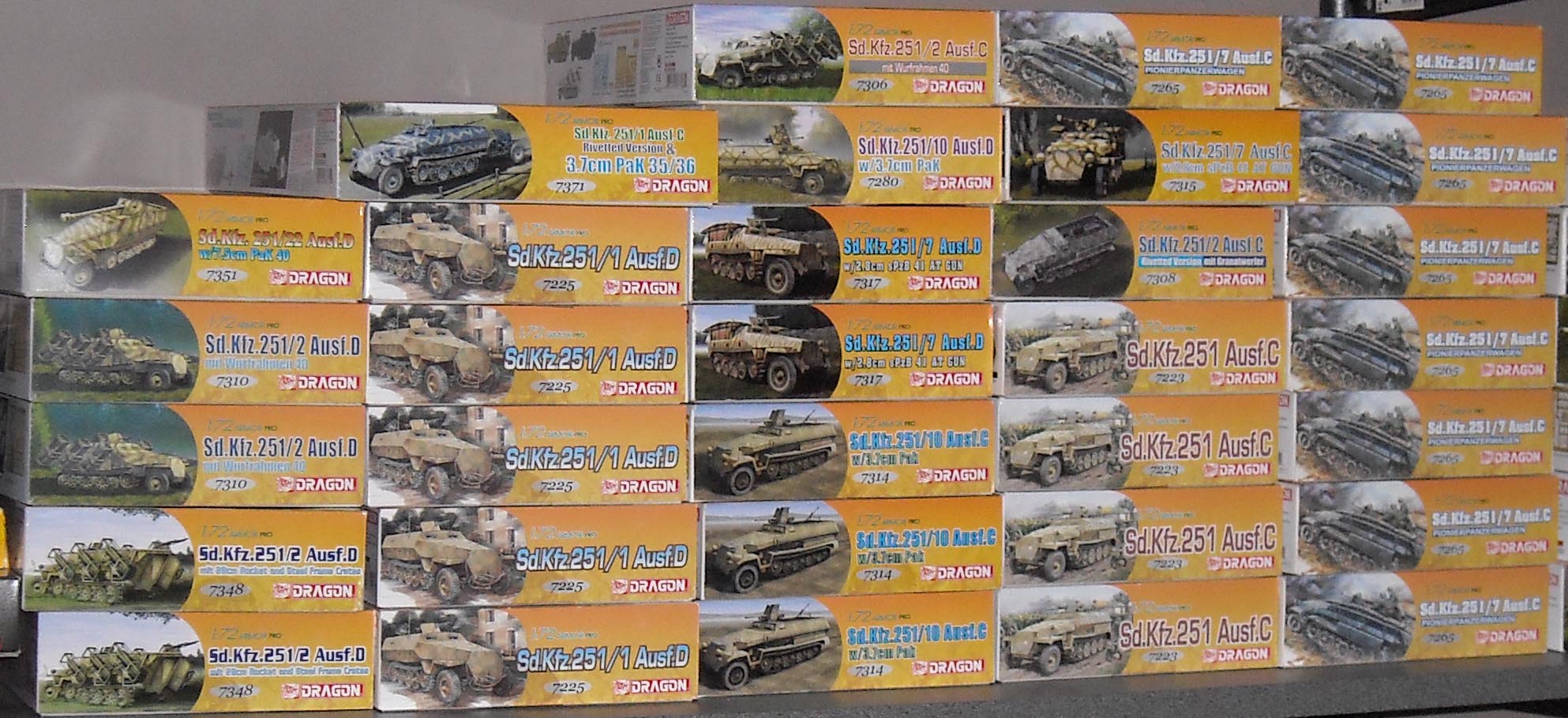
The "stash" (08 October
2009)
While some of these kits
were already the subject of a specific review, we will only outline
the differences between the different kits in this article.
Note that Dragon apparently thinks that the /2 was both a mortar carrier
and a "Stuka zu Fuss", while the latter is actually a /1.
We will use the correct designation (and not the kit label) in what
follows unless otherwise stated.
The main differences between these
kits are (besides the boxtop and manual):
- the PE set
- the decals
- the addition of variant-specific sprues
As far as I am aware no in-production changes were made to the common
parts as Dragon sometimes does with other kits.
First thing to notice is that any of
the kits can be built as a regular /1, because none of the unnecessary
parts have been omitted from the sprues; at least in my kits. So,
if you're after a /1, and don't mind the difference in decals and
manual, you might want to pick up, say, a /7 and have some pontoon
bridges for another project.
Well, I'm not telling the truth for 100%. You get a metal
rod in the /1 kits (and some others), for the antenna, which is
not included in (most of) the other variants, but it's not really
a big deal to make these from stretched sprue, piano wire, etc.
The addition of (a) PE set(s) is very
thoughtful; even more so as all (or almost all) the parts you get
in PE are also given in plastic (although with the limitations this
entails). Those with an alergy to brass or CA glue, or are simply
ham-fisted, are not left behind. At the same time you avoid having
to spend an extra Buck, Quid, Euro or Looney for an aftermarket set.
(Which does not mean aftermarket companies cannot enhance these kits
even further.)
That said, I am somewhat puzzled by the logic of these PE sets. For
instance the /1 Ausf. C gets PE for the MG shield, while the /1 Ausf.
C mit Wurfrahmen has to make do with styrene for its shield. On the
other hand, the latter gets PE parts for the fenders which are lacking
in the former.
Also, some sets include a PE licence plate for the nose. As far as
I am aware this was never fitted to the Ausf. C or D; the licence
plate number being painted directly on the armor.
The tracks
in all of these kits are of the well-known DS type and seem to represent
the Zpw 5001/280/140 Gummipolster W302 track type which is OK for
most production vehicles.
Note that the Ausf.D kits all come
with a Bosch headlight, while quite a number of the earlier models
of this Ausf. came with a Notek light. You should either get that
part from the spares box or from an aftermarket set.
Overview
| Kit Nr |
Decals |
PE |
Metal
Rod |
Sprue A |
Sprue I
chassis |
Sprue
B
|
Sprue C (2)
|
Additional
sprues |
7223
Sd.Kfz.251/1 Ausf. C
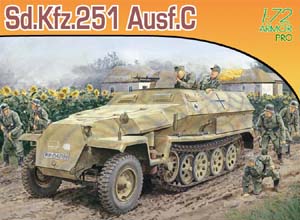 |
Generic
+ specific
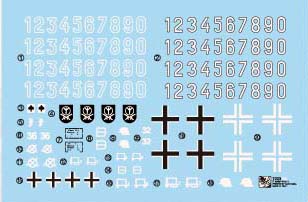 |
MG
Shield |
1 |
Ausf.
C |
Ausf.
C |
1 |
Ausf.
C |
|
7371
Sd.Kfz.251/1 Ausf. C Rivetted version & 3.7cm PaK 35/36
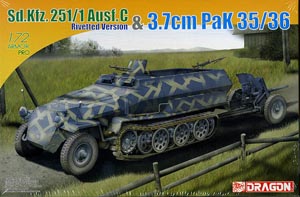
|
Generic
+ specific (labeled as from
kit 7365, which is not yet in the Dragon catalogue)
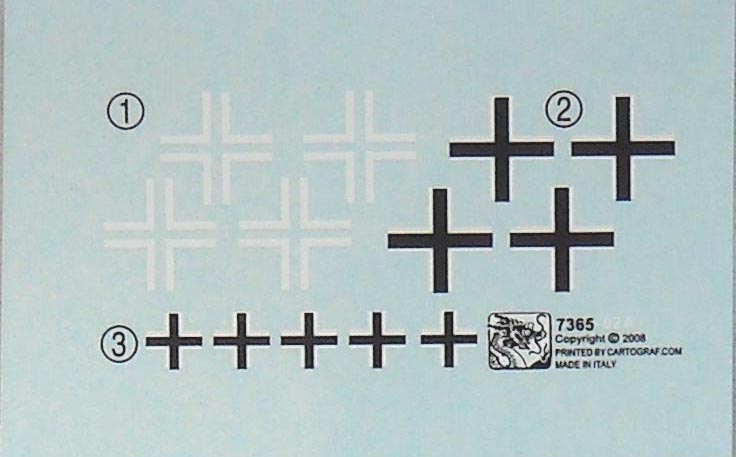
|
Rivetted
lower hull; licence plate and small fitting |
1 |
Ausf.
C with lower hull omitted (unlike in kit 7308) |
Ausf.
C |
1 |
Ausf.
C |
"Black
G": New upper hull, nose and rear plate,etc., with rivets
"Blue
G" : 2 different small sprues for PaK
(similar to those in kits 7314
and 7280, but now with a wheeled carriage instead of a roof mounting) |
7306
Sd.Kfz.251/1 Ausf. C
mit Wurfrahmen
(labeled as a /2)
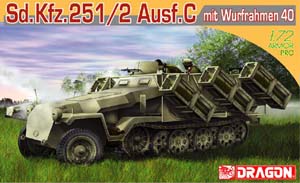
|
Slightly modified generic sheet
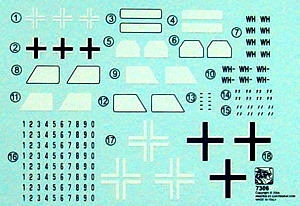
|
Fenders
and Wurfrahmen details |
0 |
Ausf.
C |
Ausf.
C |
1 |
Ausf.
C |
3 x "E":
Wurfrahmen (only with 32cm rockets) |
7308 Sd.Kfz.251/2 Ausf.
C Rivetted Version mit Granatwerfer
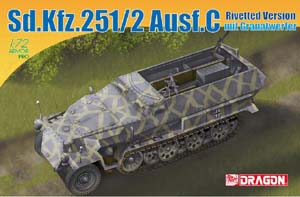
|
Generic
+ specific
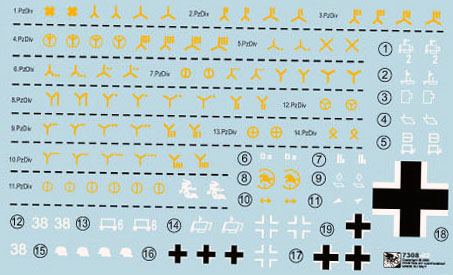
|
Rivetted
lower hull and ammo bins |
1 |
Ausf.
C (slightly modified) |
Ausf.
C |
1 |
Ausf.
C |
"F":
Granatwerfer
"G": New
upper hull, nose and rear plate,etc., with rivets
(For more details see Simon Barnes' preview.)
|
7265
Sd.Kfz.251/7 Ausf. C
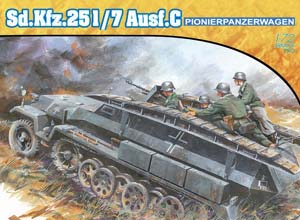
|
Generic
+ specific
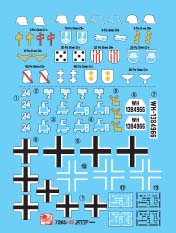
|
MG,
mudflaps, licence plate, ... |
0 |
Ausf.
C |
Ausf.
C |
1 |
Ausf.
C |
2 x "E":
Bridges |
7315
Sd.Kfz.251/7 Ausf. C with 2.8cm sPzB41
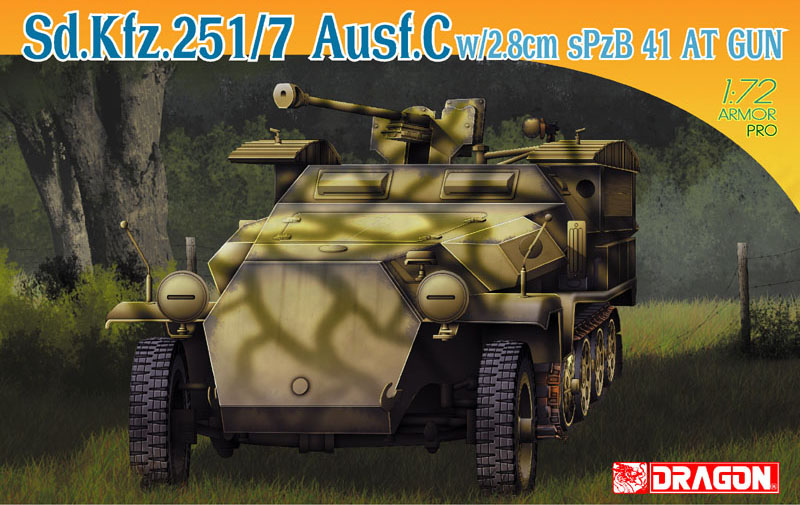
|
Generic
+ sheet from 7223
(?) |
Fenders
(same as 7314 & 7315) + gun
shield + ammo bins
(same as 7314) |
0 |
Ausf.
C |
Ausf.
C |
1 |
Slightly
modified Ausf. C |
2 x "E":
Bridges (same as 7265)
"G" : 3different
small sprues for sPzB |
7314
Sd.Kfz.251/10 Ausf. C
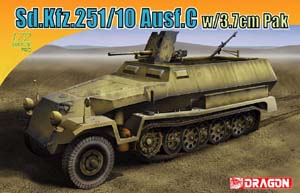
|
Generic
+ sheet from 7223
(?)
|
Fenders
(same as 7306 & 7315),
PaK shield (same as 7280),
ammo bins (same as 7315) |
0 |
Ausf.
C |
Ausf.
C |
1 |
Slightly
modified Ausf. C |
"G"
: 4 different small sprues for PaK
(similar to those in kits 7371, but with parts
for roof mounting instead of wheeled carriage) |
7225
Sd.Kfz.251/1 Ausf. D
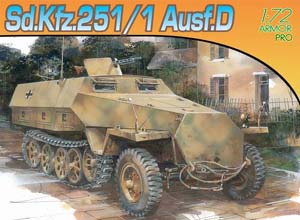
|
Generic
+ specific
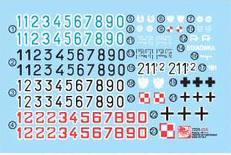 |
MG
Shield |
1 |
Ausf.
D |
Ausf.
D |
1 |
Ausf.
D |
|
7310
Sd.Kfz.251/1 Ausf. D
mit Wurfrahmen
(labeled as a /2)
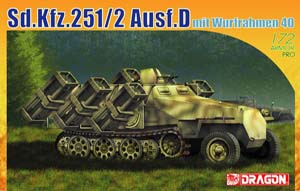
|
Generic
+ specific
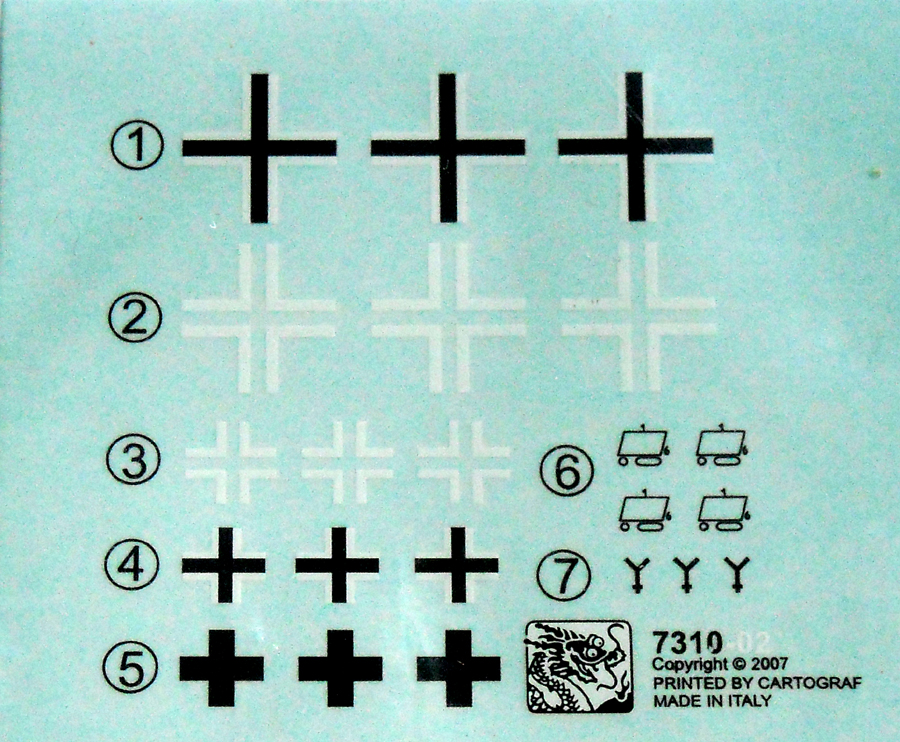
|
MG
shield and Wurfrahmen
details (same as 7306) |
0 |
Ausf.
D |
Ausf.
D |
1 |
Ausf.
D |
3 x "E":
Wurfrahmen (with 28cm and 32cm rockets) |
7348
Sd.Kfz.251/1 Ausf. D
mit
28cm rocket and steel frame crates
(labeled as a /2)

|
Generic
+ specific
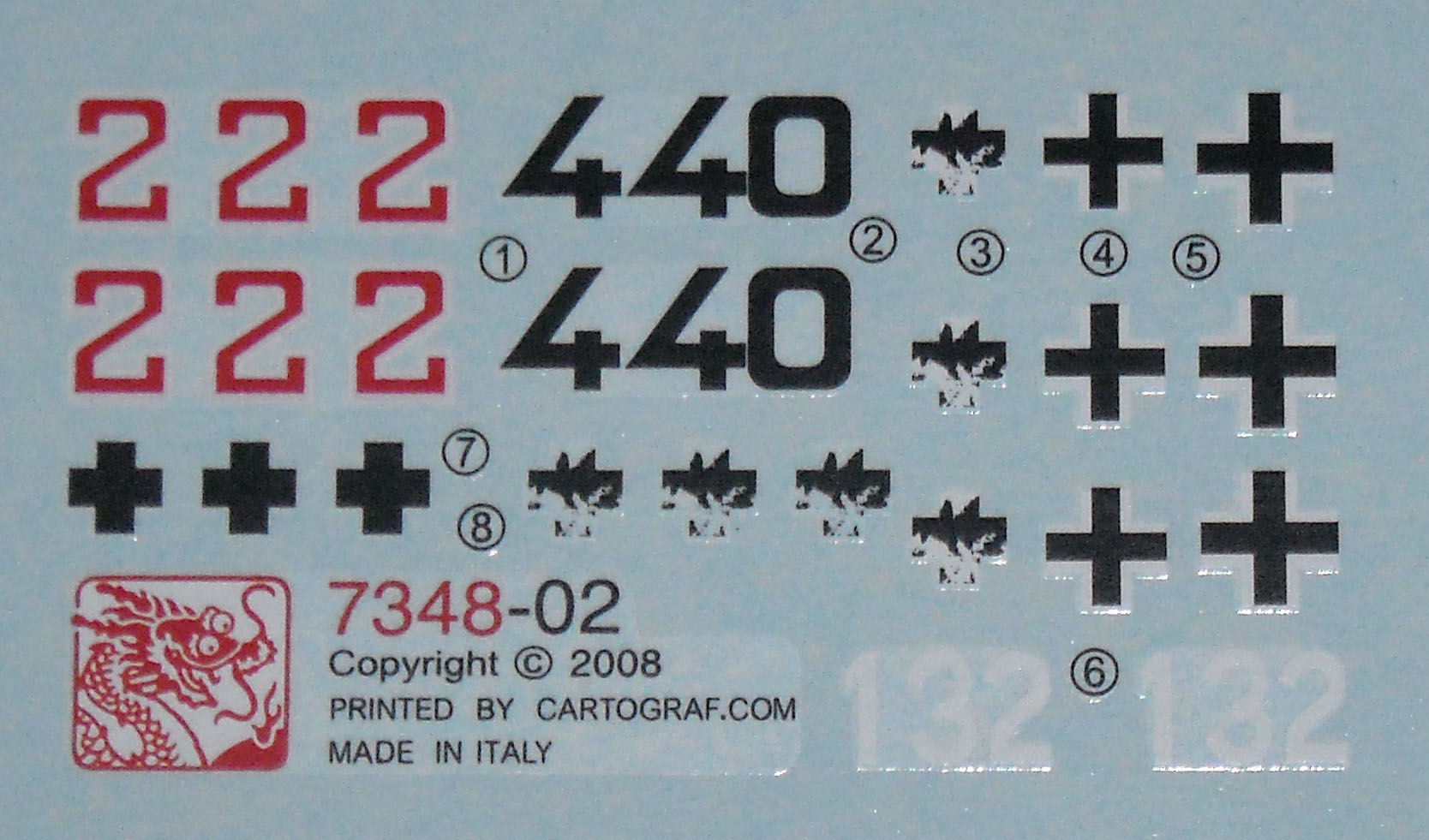
|
MG
shield, Wurfrahmen
details (same as 7306) and Wurfrahmen
frames |
0 |
Ausf.
D |
Ausf.
D |
1 |
Ausf.
D |
3 x "E":
Wurfrahmen (only with 28cm rockets) but no
wooden crates |
7369
Sd.Kfz.251/1 Ausf. D & 75mm PaK40
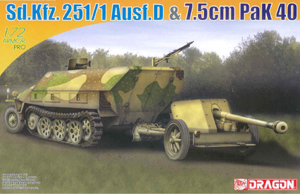
|
Slightly
modified generic sheet |
MG
shield and small PaK
part |
1 |
Ausf.
D |
Ausf.
D |
1 |
Ausf.
D |
H: upper
part of PaK40
J: lower part of PaK40
|
7317
Sd.Kfz.251/7 Ausf. D with 2.8cm sPzB41
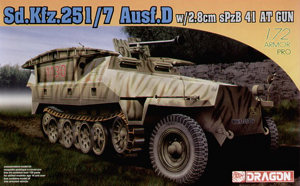
|
Generic
+ 2 specific sheets
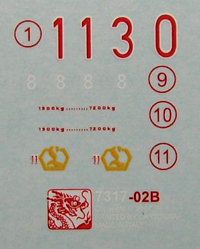

|
Brackets/licence
plates + gun shield
(same as 7315) |
0 |
Ausf.
D |
Ausf.
D |
1 |
Ausf.
D |
2 x "E":
Bridges (same as 7265)
"G" : 2
different small sprues for sPzB
(one in common with 7314 and 7280 - same as 7315
minus ammo boxes) |
7280
Sd.Kfz.251/10 Ausf. D
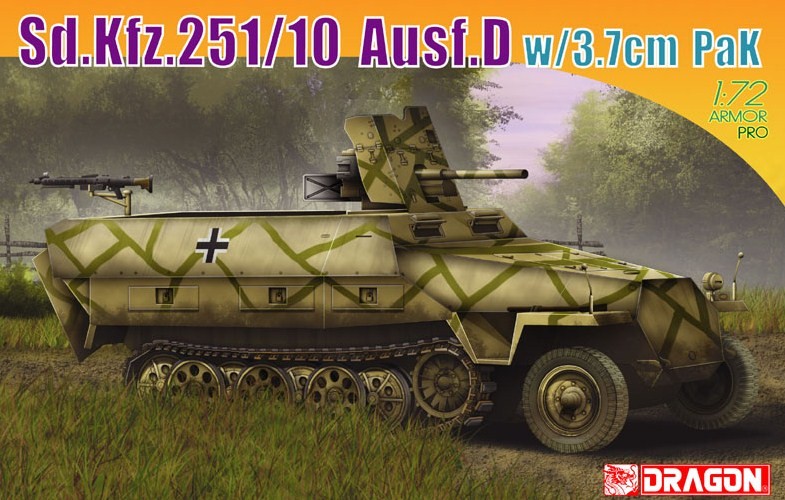 |
Slightly modified generic sheet
(same as 7306) |
Brackets/licence
plates (same as 7317), PaK
shield (same as 7314) |
0 |
Ausf.
D |
Ausf.
D |
1 |
Ausf.
D |
"G"
: 3 different small sprues for PaK
(as 7314 minus ammo boxes)
|
7351
Sd.Kfz.251/22 Ausf. D
 |
Generic
+ specific
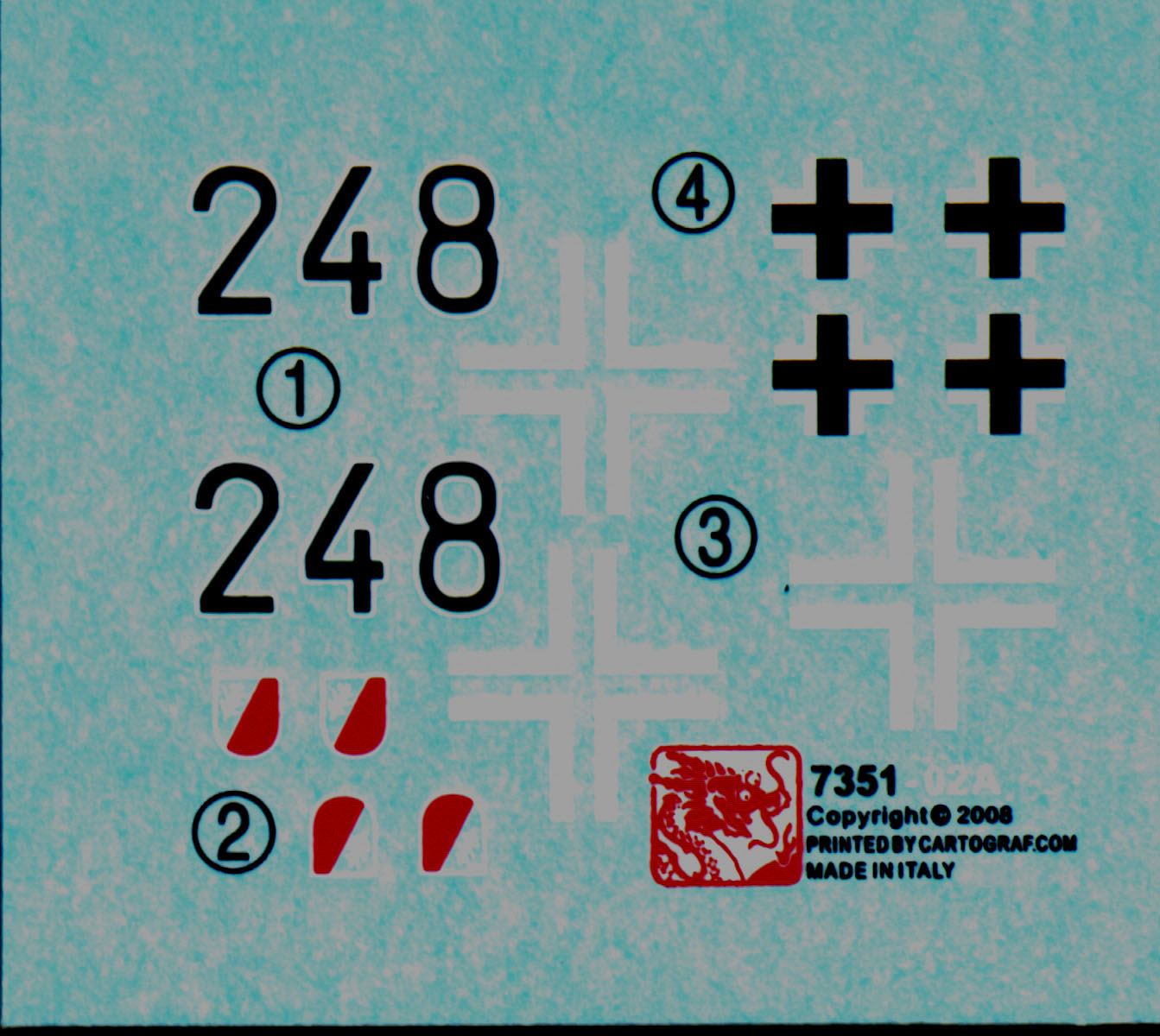 |
Gun
mount and engine hatch |
1 |
Ausf.
D |
Ausf.
D |
1 |
Ausf.
D |
H: upper
part of PaK40 |
Decals and
Markings
Most kits get, what I called, a generic
sheet. This is a sheet containing licence plates and licence plate
numbers. As the numbers and prefixes are separate, the nice thing
about this system is that you can compose any specific licence plate
number you would like from Heer or Waffen-SS inits (WL prefixes for
the Luftwaffe are not included). The not-so-nice thing about this
sytem is that you HAVE to compose any licence plate number from individual
numbers, if it does not happen to be included on another sheet. Worse,
the SS runen are split in half, so you need 4 decals to form "SS".
I haven't tried these
decals yet, but as they are done by Cartograf, I have no doubt they
are of high quality.
7223 Sd.Kfz.251/1
Ausf. C

You get an admirable
seven marking options.
- Panzer Grenadier Division Grossdeutschland, Kursk 1943. Dark yellow,
green and brown.
- Infantry Division Grossdeutschland, Eastern Front 1942. Dark gray.
- 4 Pz.Div., Eastern Front, 1943. Dark yellow, with a little bit of
green on the side bins. Number 321
- Panzer Grenadier Division Grossdeutschland, Eastern Front 1943.
Dark yellow and dark grey.
- Unknown unit, Eastern Front, 1943. Dark yellow with a little bit
of light (?) gray. (The latter color is not identified in the color
map.)
- 4 Pz.Div., Eastern Front, 1944. Dark yellow with white splotches.
- Pz. Lehr Div., Hungary, 1944. Dark yellow, green and brown.
Only three of these
actually have a licence plate, so if you're lazy, choose one of the
others.
Also worthy of mention is that Dragon lets you choose some marking
options (e.g. style of numbers).
On the decal
sheet specific for this kit you get all the markings necessary
for the options on the manual and a large selection of numbers. Only
a few are needed for one of the marking options, so all the others
will spice up your spares box.
7271 Sd.Kfz.251/1
Ausf. C Rivetted
version & 3.7cm PaK 35/36
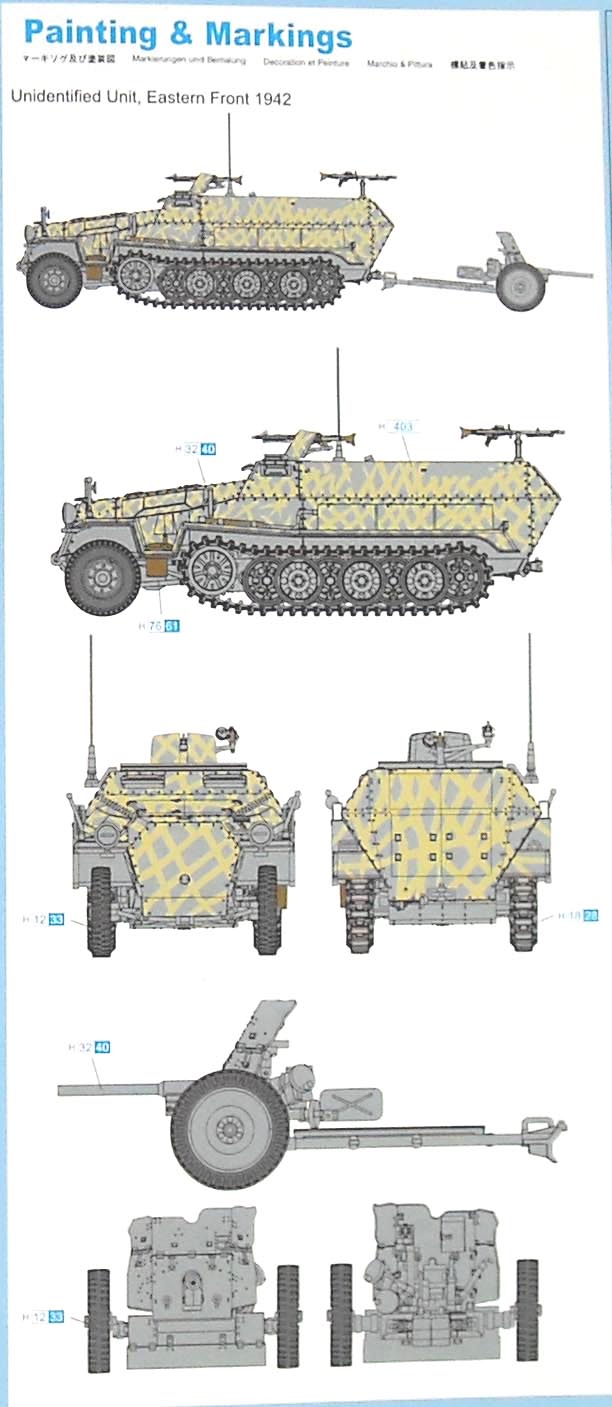
You get a miserable choice of markings, consisting
of one option, and it's a vehicle of
the ubiquitous "unknown unit", Eastern Front 1942, in dark
grey with dark yellow stripes, without any markings at all. The Pak
is uniform dark grey. The vehicle does not even carry a Balkenkreuz,
a licence plate, .... nothing !
Again, Dragon is either running out of inspiration or rushing it.
While this means you would actually not even need a decal sheet, you
get two sheets which give you some Balkenkreuze and licence plates.
7306 Sd.Kfz.251/1
Ausf. C mit Wurfrahmen 40 (labeled as /2)
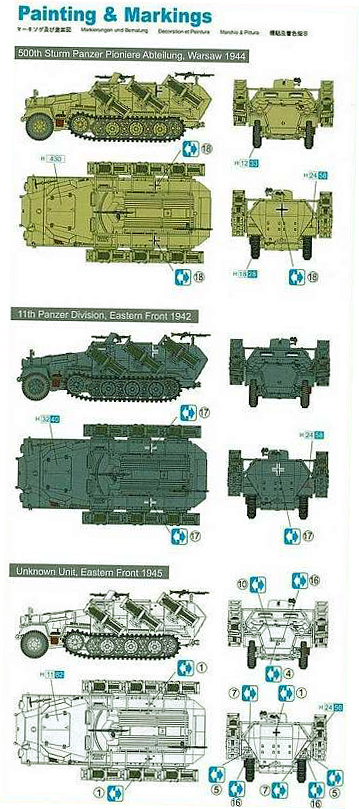
You only get three
marking options in this kit. By "only" I mean that I got
used to Dragon offering more choices in other kits, although a decade
or so we would have been delighted to have been given more than a
single marking option.
The marking options are:
- 500th Sturm
Panzer Pioniere Abteilung, Warsaw 1944. Dark yellow.
- 11 Pz.Div., Eastern Front, 1942. Dark gray.
- Unknown Unit, eastern Front, 1945. Whitewashed.
Only the last of these
three actually carry a licence plate, which has to be composed.
The markings themselves
are minimal compared to other kits: no unit insignia, only licence
plates and Balkenkreuze (in three styles).
Most of the "Stuka zu Fuss"
had aiming rods on the engine deck to help the driver align the vehicle
with the target. These are missing in the kit. Apart from that, I
guess most of the remarks made for kit 7310 will also be valid for
this one.
7308 Sd.Kfz.251/2 Ausf. C Rivetted
Version mit Granatwerfer
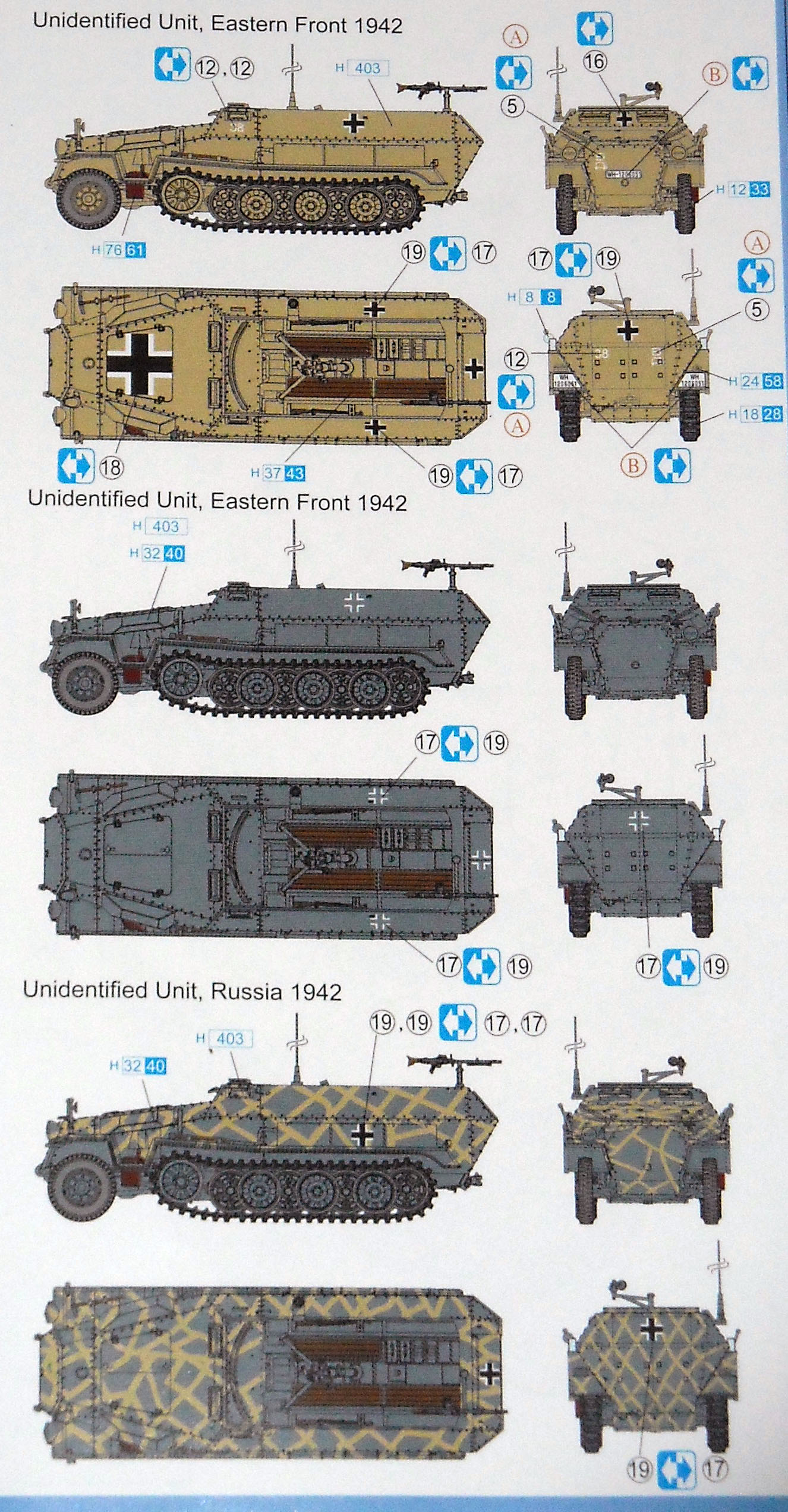
For this kit you get three marking
options, all for unidentified units:
- Unidentified unit, Eastern Front 1942. No color name is given, and
while it looks dark yellow, it will more likely be a desert color,
given the time frame. (Some vehicles destined for Afrika ended up
in Russia, and desert colors blended in well with southern sectors
of the Eastern Front.) A large Balkenkreuz is painted on the engine
hatches for aerial recognition.
- Unidentified unit, Eastern Front 1942. Overall dark grey.
- Unidentified unit, Russia 1942. Dark grey with light brown "criss-cross"
stripes. The latter areprobably a desert color, or foreign, if the
date is correct.
Only the first vehicle carries a WH-licence
plate, and this has to be manually composed.
Even though all three marking options are for unidentified units,
Dragon has been very thoughtful in providing a plethora of (spare)
unit markings (all in yellow):
- 1 Pz.Div: three different unit insignia (2 each)
- 2 Pz.Div: two different unit insignia (2 each)
- 3 Pz.Div: two different unit insignia (2 each)
- 4 Pz.Div: four different unit insignia (2 each)
- 5 Pz.Div: two different unit insignia (2 each)
- 6 Pz.Div: two different unit insignia (2 each)
- 7 Pz.Div: four different unit insignia (2 each)
- 8 Pz.Div: four different unit insignia (2 each)
- 9 Pz.Div: three different unit insignia (2 each)
- 10 Pz.Div: three different unit insignia (2 each)
- 11 Pz.Div: two different unit insignia (2 or 4 each) plus the "Gespenster"
(ghost) marking
- 12 Pz.Div: one style of unit insignia (2 each)
- 13 Pz.Div: one style of unit insignia (2 each)
- 14 Pz.Div: one style of unit insignia (2 each)
The decals above are not numbered. You also get "numbered"
decals, of which only a small part is needed for the proposed vehicles:
1-5,13,14: white tactical markings; only "5" is actually
referred to
6: White "D a". I haven't got a clue what it refers to
7: White "Kursk Marking" for 3 Pz.Div.
8: Yellow 24 Pz.Div. insignia
9: Unknown insignia (black and white)
10: Yellow 22 Pz.Div. insignia
11: Unknown insignia (white)
12: White "38", used on the first marking option
15: White Grossdeutschland "Stahlhelm" insignia
16-19: Balkenkreuze
Given the fact that this kit can be
built as a welded or a rivetted version, as a /2 or a /1 and the vast
amount of spare decals, this is one of my favorite kits in the series
(together with the /7). If you build it as a welded /2, you can use
the spare parts to convert any other Ausf.C to a rivetted hull.
Most of the mortarcarriers had aiming
rods on the engine deck to help the driver align the vehicle with
the target. These are missing in the kit.
7265 Sd.Kfz.251/7
Ausf. C
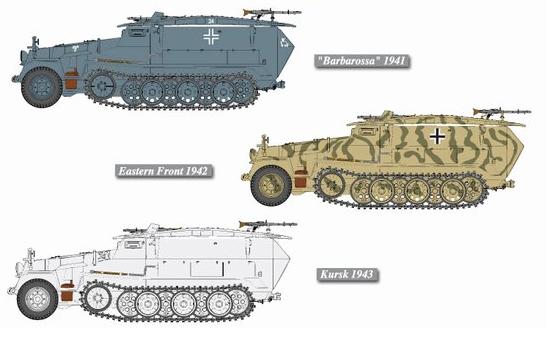
You again only get
three marking options. They are:
- Dark gray vehicle "Barbarossa 1941" (with licence plate
WH-1384965; a well-known vehicle from the cover of Panzer Tracts 15-2)
- Whitewashed vehicle "Eastern Front 1942"
- Dark Yellow and green vehicle "Kursk 1943", but with 10
Pz.Div markings, which can't be correct.
Only the first of these
three actually carries a licence plate. What is actually more disappointing
is that Dragon does not mention the unit these vehicles belong to.
Also worthy of mention is that Dragon lets you choose within a marking
option between styles of crosses, colors of markings etc.
The decal
sheet which is specific for this kit has a lower part containing
the decals to be used for the three marking options in the manual
(see above) and an upper part with a collection of unit markings that
are spares. This is very thoughtful of Dragon, as you can use them
on any vehicle you would like if you are not using them on this one.
On offer are
- "Grossdeutschland ("steel helmets")
- 3.Pz.Gren.Div.
- 10.Pz.Gren.Div.
- 16.Pz.Gren.Div.
- 18.Pz.Gren.Div.
- 19.Pz.Gren.Div.
- 20.Pz.Gren.Div.
- 22.Pz.Gren.Div.
- 25.Pz.Gren.Div.
- 29 Pz.Gren.Div.
- 60.Pz.Gren.Div.
- 90.Pz.Gren.Div.
(Actually, the lower part of the sheet also contains some spares.)
Note that the licence plate for the first marking option is pre-assembled.
Decal-wise this is
clearly one of the best kits (together with 7308). Not only do you
get lots of spares, but if you keep to the proposed markings you do
not need to fiddle with composing licence plates, although you can
if you'd want.
Note that the
bridge sections look like the 16 ton version, which was not a very
common type and that Dragon provides optional wooden planks (parts
E3) that crews often fitted between them to create makeshift stowage
bins.
Also note that part B29 is "blued out" in the parts diagram,
but it seems that most of these vehicles did carry the antenna mount
that this part represents.
7315 Sd.Kfz.251/7
Ausf. C with 2.8cm sPzB 41
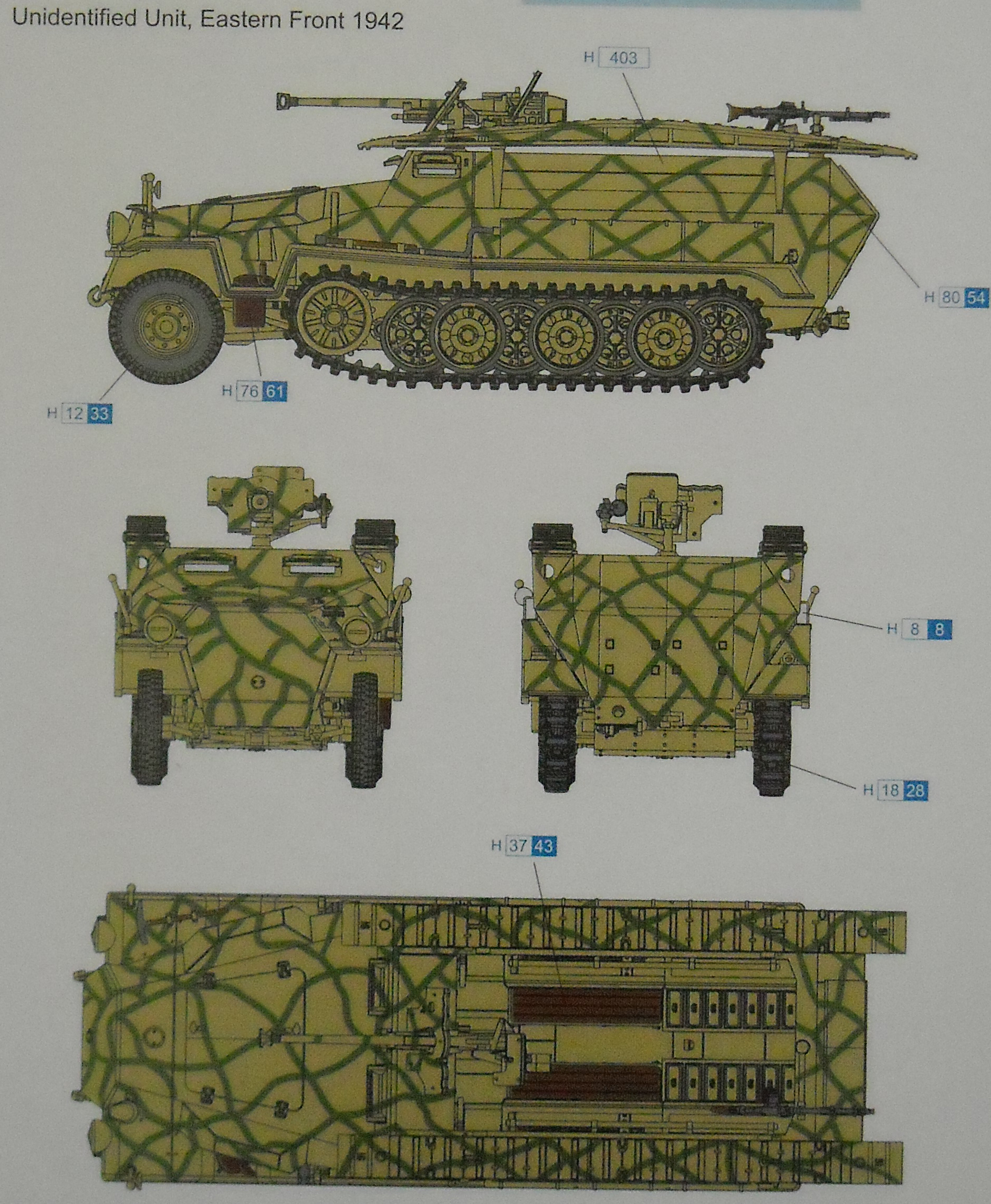
This is a very disappointing
kit when it comes to markings. You only get one option, and it's a
vehicle of an unknown unit, in dark yellow with green stripes, without
any markings at all !!!
Not even Balkenkreuze, a licence plate, .... nothing !
Dragon must have run out of inspiration, when you compare this with
their Sd.Kfz. 251/2 Ausf. C, Sd.Kfz. 251/7 Ausf. C or Sd.Kfz. 251/1
Ausf. D !
This means you would
actually not even need a decal sheet. Still, you get two sheets: the
generic sheet and the exact same sheet as that
included in the Sd.Kfz.251/1 Ausf.C. (The kit number wasn't even
changed on it.)
The good thing is that
this kit can be built as a regular /1 or /7, which would leave you
with a nice Panzerbüchse for which you would only need a donor
Lafette.
Note that the PE parts
allow you to create the "double armor" shields so familiar
on German guns.
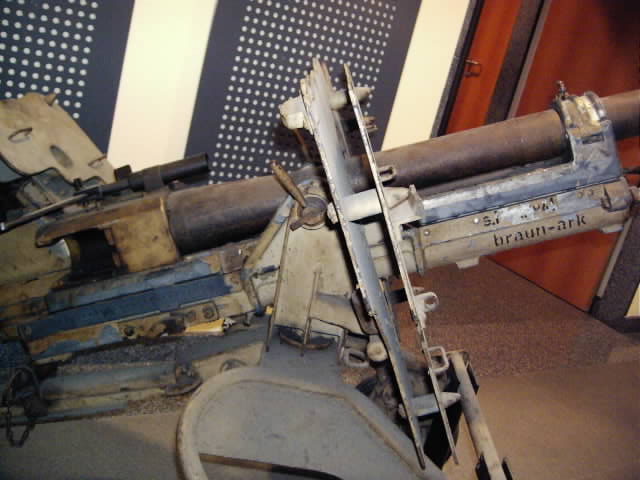
Picture taken by myself at the office
7314 Sd.Kfz.251/10
Ausf. C
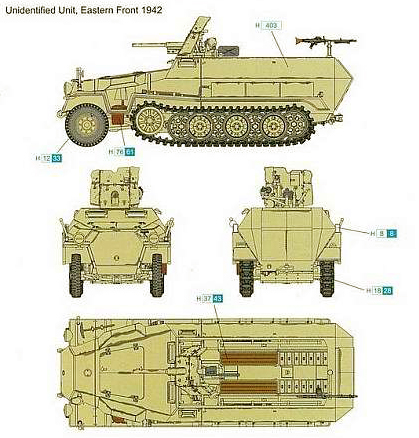
This is a very disappointing
kit when it comes to markings. You only get one option, and it's a
plain dark yellow vehicle of an unknown unit without any markings
at all !!!
Not even Balkenkreuze, a licence plate, .... nothing !
Dragon must have run out of inspiration, when you compare this with
their Sd.Kfz. 251/2 Ausf. C, Sd.Kfz. 251/7 Ausf. C or Sd.Kfz. 251/1
Ausf. D !
This means you would
actually not even need a decal sheet. Still, you get two sheets: the
generic sheet and the exact same sheet as that
included in the Sd.Kfz.251/1 Ausf.C. (The kit number wasn't even
changed on it.)
If these lines sound
familiar, they sadly are.
So, if you are not
really after the /10, this is one to pass by. If you do want a /10
keep in mind that the PaK-shield is a very nice PE
part, but you do not get a styrene equivalent. If you want a low
cut shield, you are in for some scratchbuilding.
7225 Sd.Kfz.251/1
Ausf. D
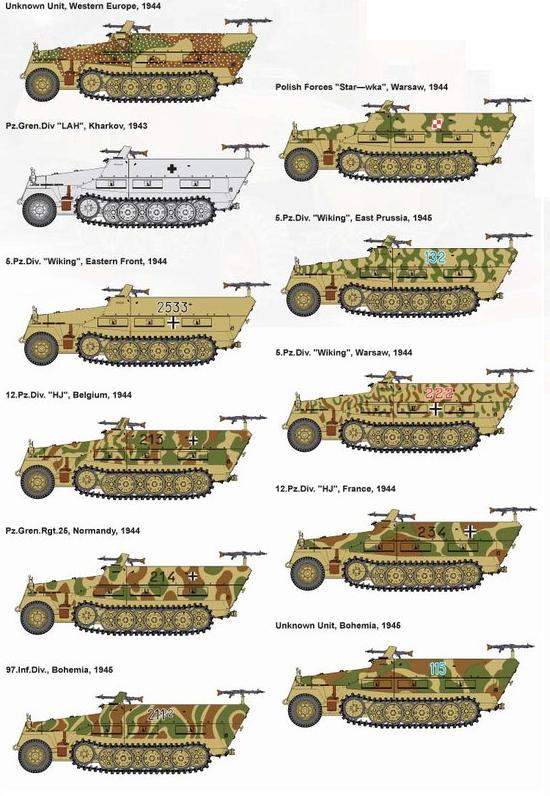
You get a whopping
11 marking options !
- Unknown Unit, Western
Europe, 1944. "Ambush" (Licht und Schatten) scheme.
- Polish Forces "Starowka", Warsaw, 1944. Dark yellow and
green.
- Pz.Gren.Div. "LSSAH" (Dragon calls it "LAH"
for "technical" reasons), Kharkow, 1943. Whitewashed.
- 5. SS Pz.Div. "Wiking" (Dragon calls it 5.Pz.Div. for
"technical" reasons), East Prussia, 1945. Dark yellow and
green. Number "132".
- 5. SS Pz.Div. "Wiking" (idem), Eastern Front, 1944. Dark
yellow. Number "2533".
- 5. SS Pz.Div. "Wiking" (idem), Warsaw, 1944. Dark yellow,
green and brown. Number "222".
- 12. SS Pz.Div. "HJ" (Dragon calls it 12.Pz.Div. for "technical"
reasons), Belgium, 1944. Dark yellow, brown and green. Number "213".
- 12. SS Pz.Div. "HJ" (idem), France, 1944, Dark yellow,
brown and green. Number "234".
- Pz.Gren.Rgt. 25, Normandy, 1944. Dark yellow, brown and green. Number
"214" I am not 100% sure about this one, but it will more
likely be the SS Pz.Gren.Rgt. 25 (part of 12 SS.Pz.Div. "HJ"),
which was present in that theatre of operations, while Pz.Gren.Rgt.
25 (part of 12 Pz.Div.) was on the Eastern front in 1944.
- Unknown Unit, Bohemia, 1945. Dark yellow, brown and green. Number
"115" .
- 97 Inf.Div., Bohemia, 1945. Dark yellow, brown and green. Number
"211 over 322".
Only two of these actually
have a licence plate (which needs to be assembled), but
- "Starowka"'s licence plate doesn't have a number in the
manual.
- The other vehile with a licence plate is number 132 from 5 SS Pz.Div.
Again, for "technical" reasons, the licence plate is a "WH"
one. While it is quite obvious these need to be "SS", I
have no idea about the number though.
It is very strange
that Dragon only chooses one non-SS unit (apart from the "unidentified"
ones), while it is so sensitive about political correctness. Plenty
of Heer units used this vehicle, so why not use those ? It is even
stranger that 6 vehicles come from only 2 divisions.
It follows that at least one licence plate cannot be correct while
the standard "sunwheel" marking of 5 SS Pz.Div is not depicted
in a sinlge one of them. It could be that variations existed, but
the alternative explanation might be that Dragon modified them to
avoid representing something looking like a swastika.
Also worthy of mention is that Dragon lets you choose within some
of the marking options between styles of crosses, colors of markings
etc.
On the decal sheet which is
specific for this kit you get all the markings necessary for the
options on the manual and a large selection of numbers in 3 color/style
combinations. Only a few are needed, so all the others will spice
up your spares box.
7310 Sd.Kfz.251/1
Ausf. D mit Wurfrahmen 40 (labeled as /2)
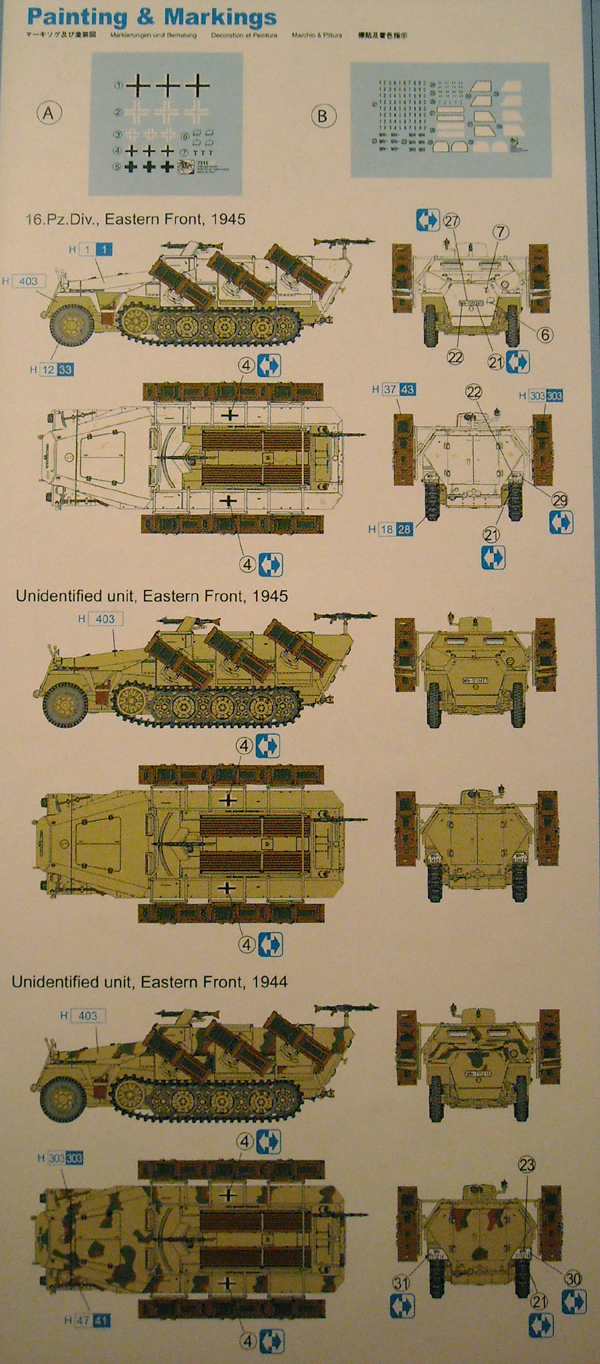
You only get three
marking options:
- 16. Pz.Div.,
Eastern Front, 1945. Whitewashed
- Unidentified unit, Eastern Front, 1945. Dark yellow.
- Unidentified unit, Eastern Front, 1944. Dark yellow with green and
brown.
The markings on the
decal sheets are minimal compared to other kits: mainly Balkenkreuze
plus some tactical markings, but no unit insignia. All vehicles carry
licence plates which need to be composed.
Most of the "Stuka zu Fuss"
had aiming rods on the engine deck to help the driver align the vehicle
with the target. These are missing in the kit.
The missile bodies are nicely done,
but cleaning up the casting seem is going to prove a real pain. Also,
to be 100% correct, you need to drill out the tiny jet nozzles on
the base of the rocket. See references [1-4] for pictures. Good luck
! (Perhaps we will get a PE part for that one day.)
When assembling the wooden launcher crates, take good care to distinguish
both parts as they look very similar, but aren't. Note that the "cross-beams"
on top and bottom (purpose unknown) are all parallel, while pictures
show them in an oblique configuration. Apparently these were loosened
by the launching process, so it might be they are meant to secure
the rockets in the crates, but that's only a guess. Beware that the
rockets cannot be slid into the crates after assembly of the latter
!
The way the kit is engineered you can only choose a single elevation
for the rocket launchers, while in reality these varied from 16°
to 45°. To that effect, part MB2 is the locking handle to fix
the elevation and the quadrant (part MB3) lets you read the elevation.
This is the reason why both parts are fixed with respect to the vehicle,
while part MB1 rotates. Something to keep in mind if you decide to
modify the elevation angle.
7348 Sd.Kfz.251/1
Ausf. D mit
28cm rocket and steel frame crates (labeled
as /2)
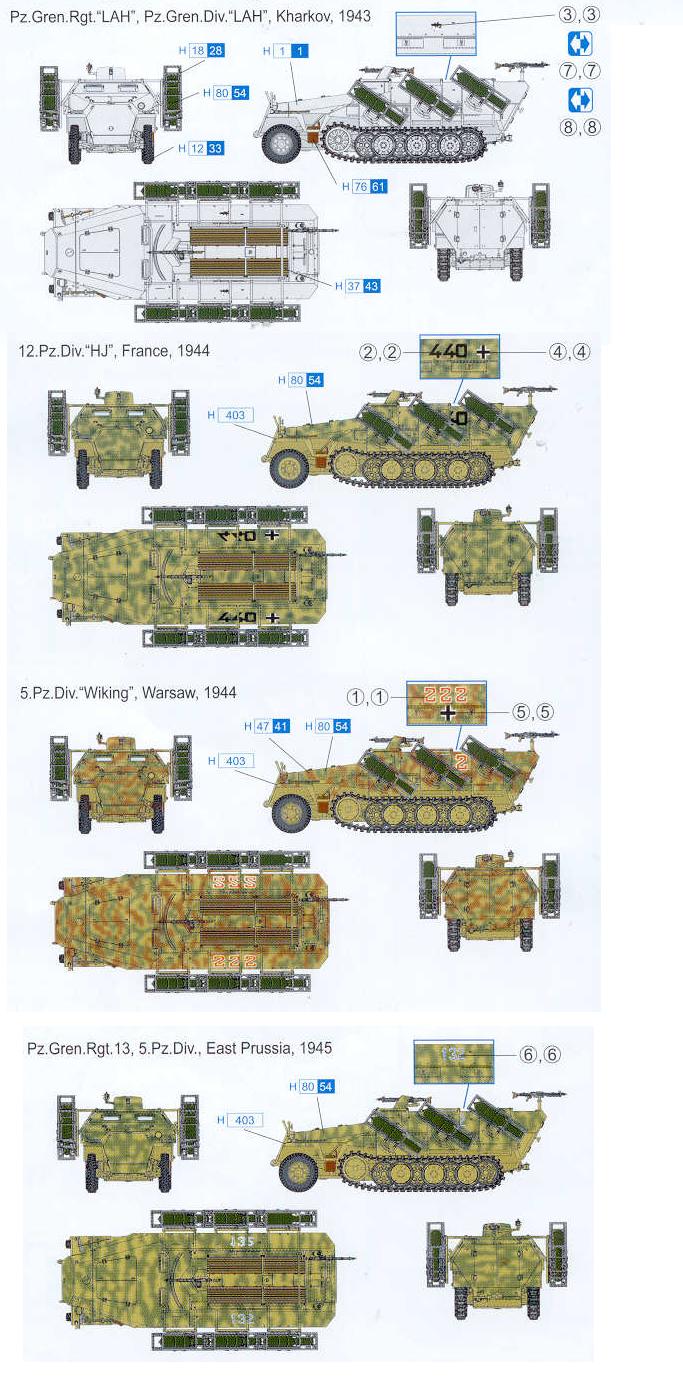
You get four marking
options:
- Pz.Gren.Rgt.
'LAH', Pz.Gren.Div. 'LAH', Kharkov, 1943 (Actually an SS unit, but
not mentioned as such)
- 12 Pz.Div. 'HJ', France, 1944. Vehicle '440'. Dark yellow and green.
(Actually 12 SS Pz.Div.)
- 5 Pz.Div. 'Wiking', Warsaw, 1944. Vehicle '222'. Dark yellow, green
and brown. (Actually 5 SS Pz.Div.)
- Pz.Gren.Rgt. 13, 5 Pz.Div., East Prussia, 1945. vehicle '132'. Dark
yellow and green.
For the first marking option Dragon
lets you choose between three styles of Balkenkreuze: solid black,
solid black with white overspray, or solid black with "see through
patches". The latter will give the same effect, but probably
in a more realistic way than the second.
You get no unit insignia on the sheet.
According to the marking instructions, none of these vehicles carries
licence plates, so the generic sheet is redundant.
Strangely enough, the marking options
clearly show the fourth vehicle with a blue and white '132', but my
decals for these markings only have white.
7369
Sd.Kfz.251/1 Ausf. D & 75mm PaK40
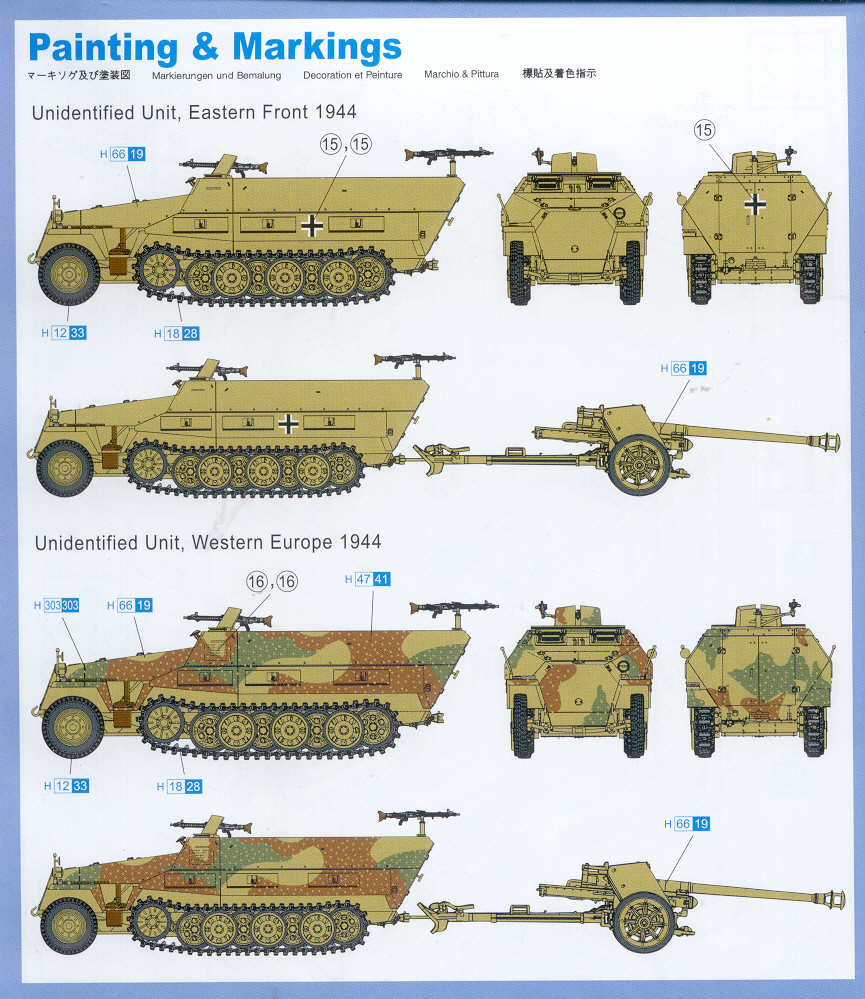
You only get two marking
options:
- Unidentified
unit, Eastern Front, 1944. Dark yellow.
- Unidentified unit, Western Front, 1944. Licht und Schatten scheme
(aka 'Ambush scheme').
The markings on the decal sheets are
minimal compared to other kits: no insignia, only 3 Balkenkreuze and
the licence plates on a slightly modified generic sheet, which now
includes a vehicle data stencil.
Note that the regular towing variant
for the Pak40 was the Sd.Kfz.251/4, although the /1 was also used
sometimes.
7317 Sd.Kfz.251/7
Ausf. D with 2.8cm sPzB 41
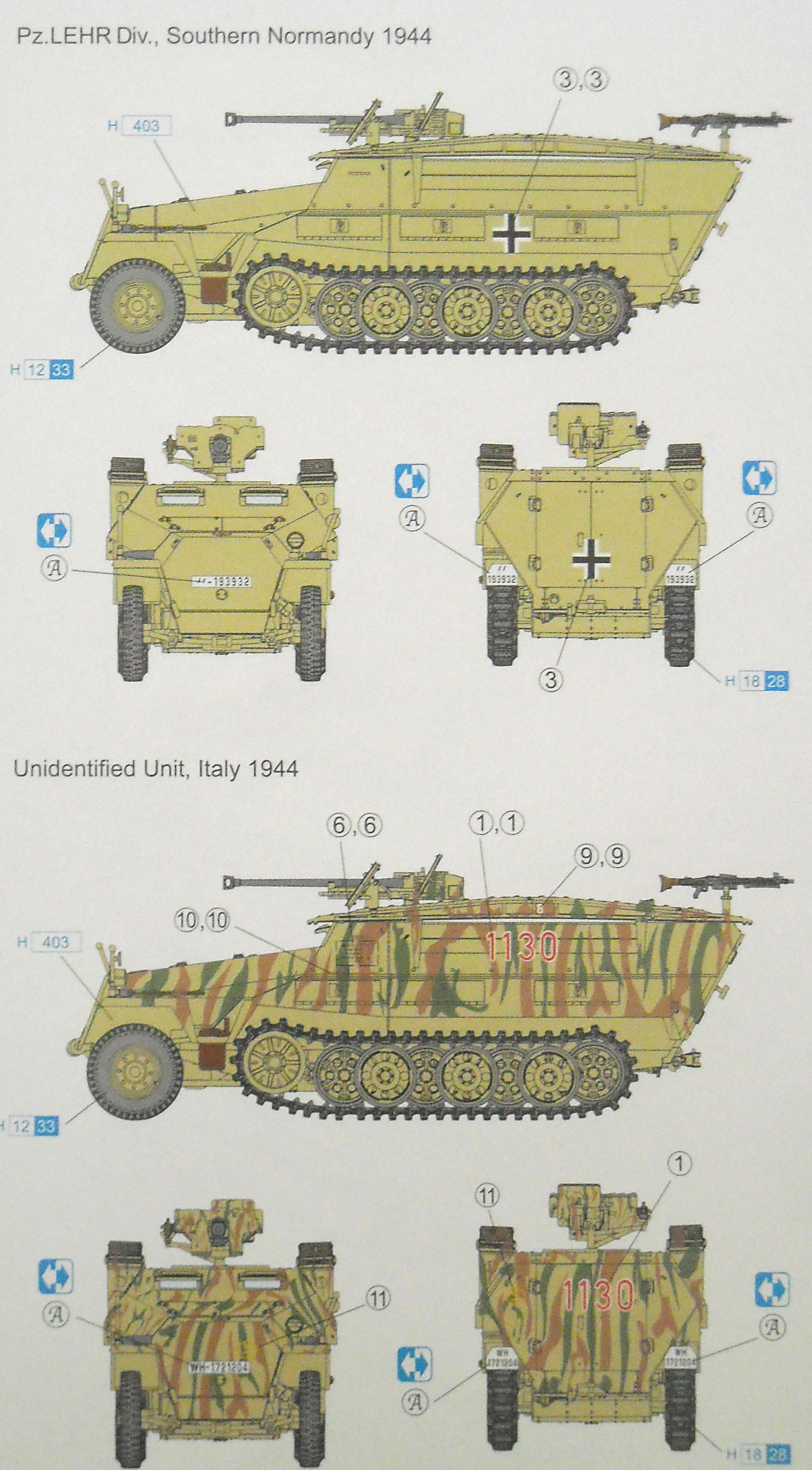
You only get two marking
options:
- Pz. Lehr. Div, Southern Normandy 1944. Plain dark yellow.
- Unidentified Unit, Italy 1944. Dark yellow with green and brown
stripes.
In my humble opinion
Dragon messed things up here. If the first vehicle is really from
Pz. Lehr, than why would it need SS licence plates? Secondly why would
the second vehicle have a big caligraphic "L" on the front
and rear? Apart from that, not too many Waffen SS units were active
on the Italian front, so the other option might at first glance be
a bit iffy as well.
The good thing is that
this kit can be built as a regular /1 or /7, which would leave you
with a nice Panzerbüchse for which you would only need a donor
Lafette.
Note that the PE parts
allow you to create the "double armor" shields so familiar
on German guns.
For some reason the
interior is left unaltered, so you get no ammo bins, as for kit 7315.
I don't know whether this is accurate, but I guess the crew had to
store the same ammo as used on the Ausf. C somewhere, so I have my
doubts.
7280 Sd.Kfz.251/10
Ausf. D
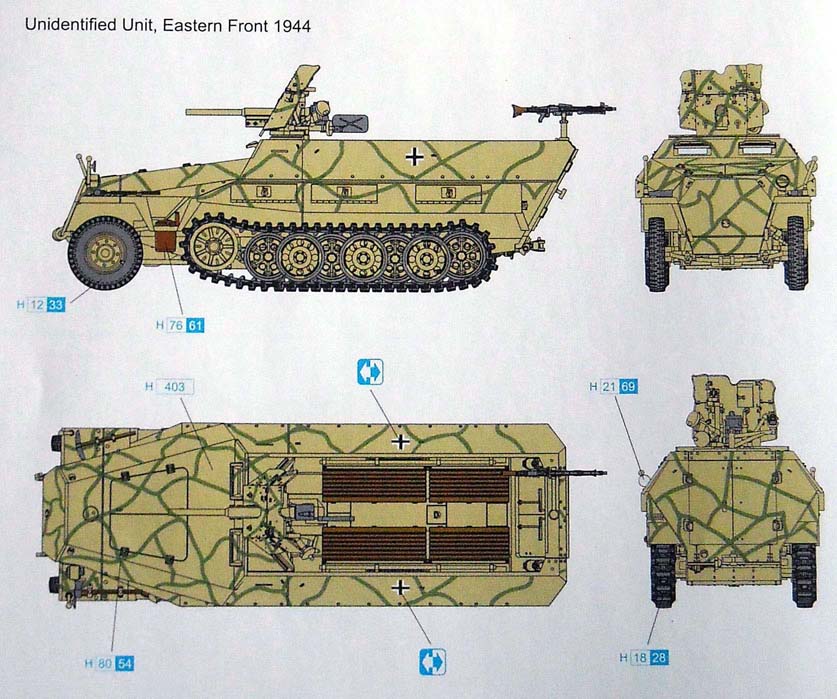
Decal-wise, this is
again a very disappointing kit, only offering a single marking option
for the ubiquitous "unidentified unit on the Eastern Front"
in 1944; camouflage is Dark Yellow + Green.
The decals are basically the generic sheet with 9 Balkenkreuze (3
styles) added and are identical to those in kit 7306. On Dragon's
website I found a review mentioning two decal sheets, but in my specimen
this was not the case; only one sheet is mentioned in the manual as
well.
Apart from that, you
could have expected this kit to be a cross-over between the Sd.Kfz.251/10
Ausf. C and Sd.Kfz.251/1 Ausf. D kits. It basically is, but for some
reason the interior is left unaltered, so you get no ammo bins, as
for the Sd.Kfz.251/10 Ausf. C kit (contrary to what the review on
Dragon's website tells us). I don't know whether this is accurate,
but I guess the crew had to store the ammo somewhere, so I have my
doubts.
Personally, if I wanted to model this variant, I would play it safe
and go for a kit-bash between the Sd.Kfz.251/10 Ausf. C and Sd.Kfz.251/1
Ausf. D, which would also leave you with a perfectly acceptable Sd.Kfz.251/1
Ausf. C.
As Jolyon Ralph pointed
out to us, it is questionable if the Sd.Kfz. 251/10 Ausf.D was ever
fitted with the full height gun shield. Modifying the PE part will
be very hard to pull off though.
7351 Sd.Kfz.251/22
Ausf. D
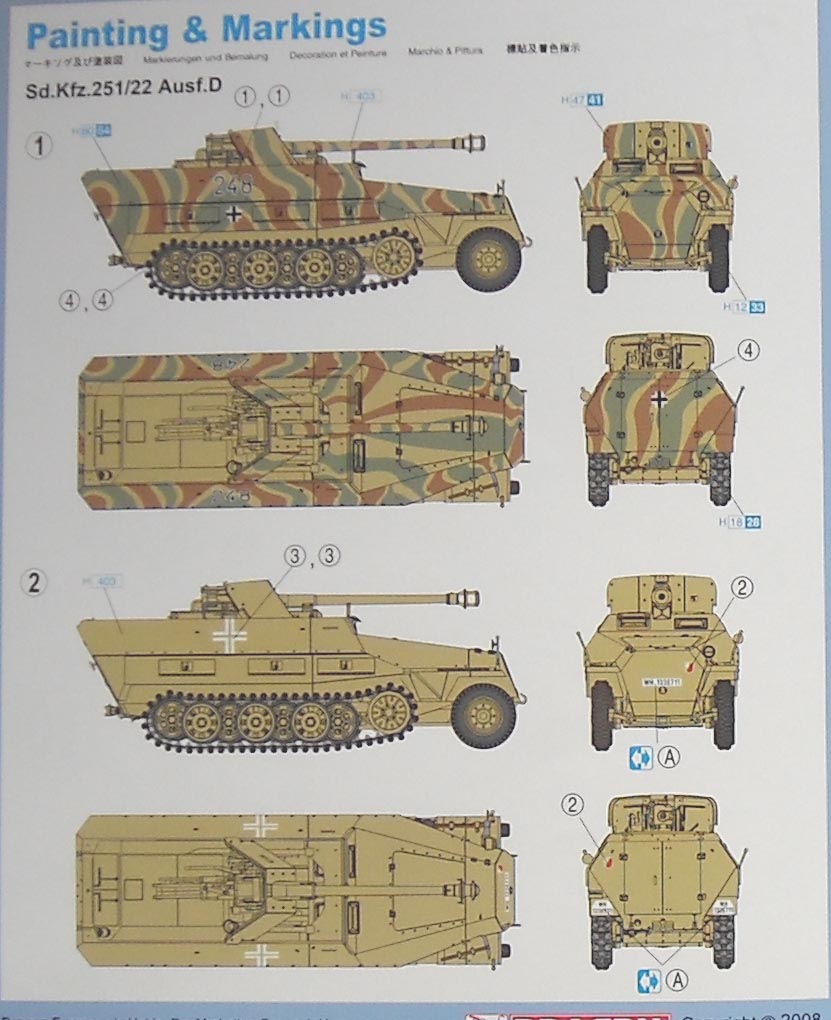
This time you get to
choose between two vehicles:
- black 248 in three color camo with black and white Balkenkreuze
and no licence plates
- a plain dark yellow vehicle with larger, white Balkenkreuze and
licence plates. It carries, what seems to be, a unit insignia.
Sadly enough, Dragon
does not indicate which units these vehicles belonged to, what front
they operated on, or at what time, even though the second vehicle
seems to carry a unit insignia, which I have been unable to identify.
You get that decal four times, while you only need it twice (according
to the instructions).
Dragon knows that late
war vehicles had a different, rear-hinged engine hatch, but clearly
doesn't know what it looked like. Either that, or they were unwilling
to alter the upper hull part. Wat they did is give you a new PE part
for the hatch, but they kept the original dimensions of the engine
compartment hatch. In reality that hatch extended more to the front
and there was a secondary laterally hinged hatch in front of it. So,
you couldn't just get away scribing that secondary hatch as you would
need to enlarge the main hatch as well. At that point you are ready
to throw away the PE part, so what was Draon's point to start with
?
I should check my reference thoroughly, but it also seems that most
of these late war vehicles had the left (driver's) visor replaced
with a simpler, flatter type and the right frontal visor either blanked
off or replaced with the same flat type. (That would be fairly easy
to scratchbuild, though.)
According to my references, some
/22s were built on the older Ausf.D chassis (e.g. one that was field
modified and shown in Panzerwrecks 2 & 6). BY "older"
I mean, with the split hatch, so you might get away by simply getting
rid of the PE engine hatch and using the older, split doors which
come in styrene as in all other Ausf. D kits.
(By comparison, Hasegawa provides flat visors in their /22 kit, but
leaves the engine deck unaltered.)
My references also tell me that the radio set was moved away from
the right front side (where the R/O used to be, but which space was
now inaccessible - hence the blanked off plate). Dragon doesn't. However,
specialists in the field are still arguing where exactly the set was
moved to...
A nice thing is that you get the choice of three types of gun barrel
for the Pak40.
Below is a rough sketch to illustrate
the issue with the engine deck.
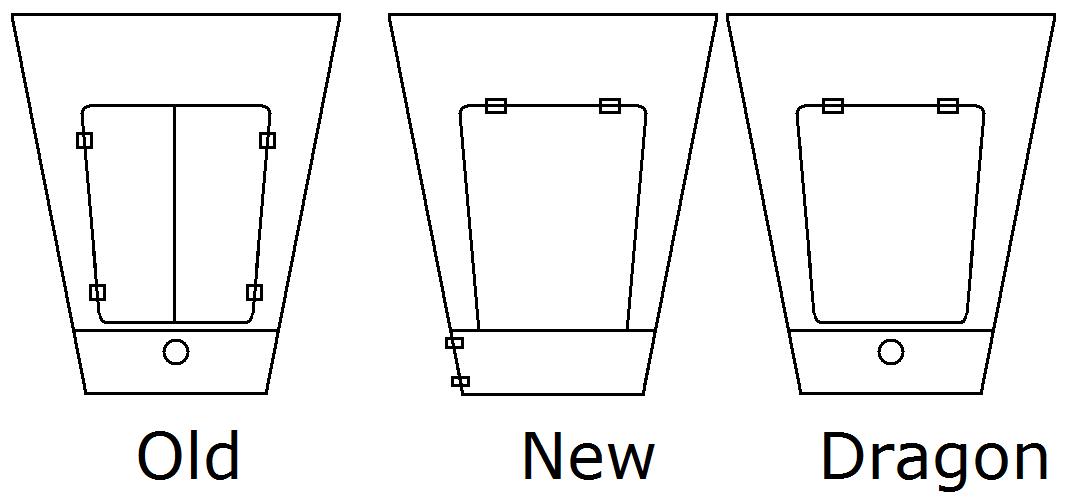
References
[1] http://www.germanmilitaria.co.uk/ammu.htm#mm320artil
[2] http://upload.wikimedia.org/wikipedia/commons/5/5b/Bundesarchiv_Bild_101I-216-0417-05,_Russland,_schwerer_Wurfrahmen_an_Sch%C3%BCtzenpanzer.jpg
[3] http://en.wikipedia.org/wiki/Wurfrahmen_40
[4] http://commons.wikimedia.org/wiki/Category:Wurfrahmen_40
[5] Panzer Tracts 15-2 mittlere Schuetzenpanzerwagen
(Sd.Kfz.251), t.L. Jentz, H.L. Doyle
|